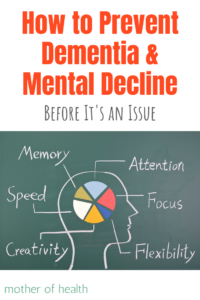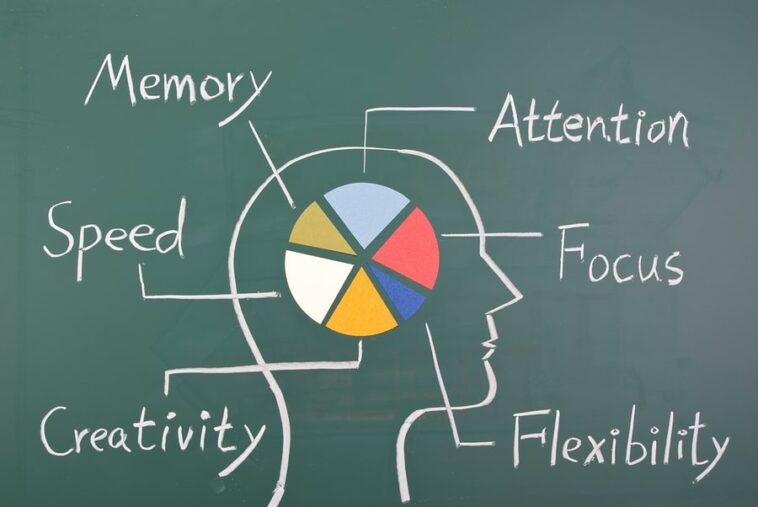Mental decline or dementia is a term used to describe a combination of behaviors, symptoms, and indications of deterioration of the brain. It isn’t a single disease but is generally used to describe the process of losing one’s thinking skills, memory, focus, or judgment. In this article, we take a look at how to prevent dementia before it's an issue.
Mental decline usually happens slowly and can go on long before actual diagnosis or medical attention intervenes. The risk of dementia increases with age, but not all older people will get dementia. Some forms of mental decline are reversible, and sometimes the causes are related to issues that are not organic.
There are many forms of dementia and memory-related diseases, so keep reading to learn how to prevent dementia and mental decline naturally.
Whether there is a diagnosis of mental imparity or not, prevention is always a great idea. In the same way, we can prevent heart disease, diabetes, and other illnesses; we can take precautions to reduce the likelihood that we will suffer the effects of mental decline.
How to Prevent Dementia and Mental Decline

Preventing mental decline is best tackled from a holistic approach. While age and genetics do play a role in whether someone will experience mental decline, there are ways to hold off the decline.
Though it seems evident that preventing mental decline includes stimulating the mind, it also includes seemingly unrelated things like:
- Eating right
- Sleeping well
- Being social
- Dropping bad habits
Our minds work best when our whole bodies are healthy. This makes sense when you understand that our minds and bodies are connected.
How we take care of our minds influences our bodies, and how we care for our bodies influences our minds. A decline in our physical health can trigger or amplify a deterioration in our minds. Keeping both healthy is a preferable prevention model.
It's important to pay attention to mental health stability throughout life and prioritize keeping your mind sharp.
Generally, anything that keeps the mind active, problem-solving, and expanding is a healthy and good thing for preventing mental decline.
Creating a lifestyle that includes eating well, exercising regularly, mindfulness and meditation, a healthy social life, and challenging and stimulating activities for the mind to work together to prevent mental decline.
Mental decline can be prevented or slowed by engaging in a holistic lifestyle that keeps both the mind and the body stimulated and functioning at its best. Creating a variety of activities and enjoying healthy choices makes all the difference in the longevity and strength of the mind.

Teach an Old Dog New Tricks – Learning Prevents Dementia and Mental Decline
We’ve all heard the term ‘use it or lose it and felt compelled to take action. Whatever becomes dormant is at risk of atrophy or wasting away. It’s the same with our minds. Preventing mental decline includes stimulating your brain and challenging it in new ways.
One of the key ways to prevent mental decline is to learn something new. Doing something that requires your brain to work harder and gives it a challenge. Doing what you’ve always done is like using the same muscle over and over again. It has muscle memory, so it doesn’t take much effort to use it. It’s the same with your brain. Learning something new that makes your brain work harder and grow is important. Challenging your mind to absorb new information or solve problems is good for your health.
Teaching an old dog a new trick is a perfect way to keep your brain healthy and avoid or slow down mental decline.
Some great activities for mental decline include:
- Games – There is an array of games that help prevent mental decline. Games that are social, including card games, board games, and innovative problem-solving games, add to the benefit because they are done with other people. Individual games like crossword puzzles, Sudoku, and Mahjong can be done anywhere. Even video games can help keep your mind strong and growing.
- Cognitive activities – Activities like reading, writing, and using critical thinking skills can help prevent or slow down mental decline. Taking tests or learning new material and teaching what you’ve learned can help the mind grow and develop.
- Puzzles – Whether it’s putting together a puzzle at a table or assembling a piece of furniture, working on puzzles helps the mind. Using the mind to decipher spatial awareness or discerning how things work together is stimulating and can help keep the mind challenged.
- Meditation – There is plenty of research and studies showing that meditation decreases stress, depression, anxiety, and pain. But did you know meditation can also change areas of the brain essential for sensory, cognitive, and emotional processing? There is data to support the fact that meditation may impact age-related declines in brain structure.
Eating well, getting plenty of exercise, and stretching the mind all work together for your mental health. Preventing mental decline or slowing down the process can be done effectively by stimulating the brain to learn and do new things.
Social Activity Prevents Mental Decline
We all witnessed the consequences of social isolation due to the pandemic. Isolation is the root cause of a lot of things including depression, early death, and diseases that affect the mind. Mental decline is related to isolation and an under-stimulation of the mind, body, and spirit.
Being social prevents mental decline and reduces incidences of depression and loneliness.
Studies show that people who feel disenfranchised and isolated tend to decline emotionally, spiritually, and mentally. This includes the onset and development of mental decline.
Living alone without enough human connection and interaction can magnify feelings of loneliness and make people unwilling or unable to keep active or engaged. This puts them at great risk for a sedentary lifestyle that includes poor diet, lack of physical activity, and little mental stimulation.
Having a social circle and engaging in activities, even one day per week, can make a big difference in personal satisfaction, quality, and quantity of life. Having a group where you belong and enjoy making contributions can help give you purpose, stimulate your mind, and give you an outlet to think more.
Humans are social creatures with a hive-minded need to collaborate. There is strength in connecting with others for conversation, problem-solving, and participating in activities. Being in isolation for too long is dangerous for mental and spiritual health.
Learning how to prevent mental decline means finding outlets to connect and participate in activities to improve mental health.

Here are some fun ways to find a tribe and keep your mind healthy.
- Get physically active – Being a member of a gym, sports team, or group that engages in physical activities can help you stay fit, social, and mentally stable. Leaving your home to get fresh air with like-minded people is exhilarating. Getting your blood pumping helps release natural endorphins that help with your mood and mindset.
- Read a good book – An old-fashioned book club is an excellent way to entertain and stimulate your mind while engaging a group to process your thoughts.
- Play Words With Friends – When you can’t leave your home, playing an online game with a group of friends is easy fun! Your smartphone has apps that make social gameplay easy and you can easily play online games with gaming consoles like X-Box. You can also play online card games and have other virtual experiences in groups.
Being social is an important part of preventing mental decline. Having a source of connection with others on a regular basis helps keep our minds fit and healthy. Find a resource that makes sense for your personal interest, time, and access, and engage in a community that helps you feel alive.
Using Healthy Foods to Fight Dementia and Mental Decline
“You are what you eat from your head down to your feet”- Pajama Sam
The foods we eat are fuel for our bodies. Our bodies were designed to use healthy foods to help nourish us and carry out essential functions. Certain vitamins, minerals, and other important properties in foods enhance our function and optimize our health. When we eat whole foods free from chemicals and too much fat, salt, and sugar, our bodies flourish.
Our mental health is directly tied to the foods we eat. In the same way, our bodies function best from healthy foods; our minds operate at their fullest capacity when we eat right.
Have you ever experienced the food fog that comes after eating a highly processed meal? This is the brain reacting to the high salt, fat, and sugar you ingest. In the same way, eating healthy foods helps your mind feel clear and better able to solve problems and make better decisions.
There are many diets that promote brain health. The Mediterranean and Macrobiotic diets are two of the preferred diets that prevent mental decline and promote a healthy brain and body.
A Mediterranean Diet is Great for Your Body and Mind

The Mediterranean diet is based on the foods that are eaten in the Mediterranean region. This diet highlights whole grains, healthy fats, veggies, fruits, fish, and very little meat outside of fish. This diet is wonderful for lowering heart-related diseases and reducing associated illnesses like diabetes and high blood pressure.
The Mediterranean diet also includes an emphasis on spending time with family and being social. The diet also encourages physical fitness and fresh air. All of these are components of the lifestyle of the Mediterranean people.
The Mediterranean diet uses a pyramid to describe food consumption and a hierarchy of which foods are good, better, and best. In essence, eating whole grains regularly is ideal, with fruits and veggies secondary and oils, meats, and meat products being occasional.
Drop These Bad Habits Before They Steal Your Mind
Starting good habits is surely a great way to lower your risk for mental decline, but stopping some equally bad habits matters too. You may start doing some good things but if you’re engaging in bad habits, they could be undermining the positive things you’re doing.
Smoking
Smoking leads to all sorts of issues. It’s not new news that smoking is bad for your health. Not only that, but it’s also an expense that can make it harder to make smart financial decisions. The sooner you stop smoking, the sooner your whole life improves. From your health to your pocketbook, quitting this bad habit makes good sense.
Eating processed foods
Processed foods have little nutritional value. They may taste great and fill you up, but they aren’t good fuel for your body. They also contribute to mental fog and overall mental decline.
While you may be unwilling or unable to eliminate all processed foods from your diet, making changes wherever you can is a great start. Eating right also promotes good choices. The more healthy foods you eat, the more you crave them. Over time you may find you’ve replaced your processed foods with healthy foods with very little effort.
Isolating
Even introverts need some social engagement. Being alone too much can cause your brain to be under-stimulated and lazy. Being in a relationship with other people helps stimulate your brain and keep it mentally acute. Breaking the isolation habit can improve your mental clarity and quality of life.
Making good choices will help prevent mental decline. So does changing bad habits! When you focus on doing something positive, check, and see if there’s something you can stop doing as well. The two combined can further prevent mental decline in a more powerful and effective way. Evaluate your lifestyle and see if there are any bad habits contributing to mental decline and do your best to stop them as soon as possible.
How to Prevent Dementia and Mental Decline with Natural Remedies
Goji Berries
Mental decline can be treated with herbs like Chinese wolfberry, commonly known as goji berries. Used by the Chinese for over 2000 years to support brain health and memory, Goji berries may protect the brain against some types of damage associated with Alzheimer’s disease.8
Black Ginger
Likely, you've never heard of black ginger before, but it's in the same family as ginger and turmeric. In fact, it looks just like regular ginger until you slice it open to find a deep purple, almost charcoal color. Like ginger and turmeric, black ginger contains powerful antioxidants that help protect brain cells from free radical oxidative damage.
Ginseng
Ginseng powder added to herbal teas may improve memory and help with symptoms of confusion.
Gotu Kola
Gotu Kola is a member of the parsley family known to revive the memory and focus the mind. It is regarded as an essential herb in Ayurveda because it is said to balance the right and left hemispheres of the brain.
Aromatherapy and Essential Oils
Basil and rosemary essential oils can be used in a bath, or in a massage oil diluted in a little carrier oil to clear the mind and stimulate mental activity.
Vitamins and Minerals
- Ensure that your diet contains plenty of vitamins B and C, as well as zinc and magnesium.
- Taking lecithin, which contains phosphatidylcholine, improves memory when taken daily.
- Take supplements that contain all 22 amino acids to improve brain function.
Don't forget to follow us on Pinterest. Thank you for your time and reading.
The information presented here is in no way meant to serve as medical advice. It is merely information and opinion. All information, content, and material of this website is for informational purposes only and are not intended to serve as a substitute for the consultation, diagnosis, and/or medical treatment of a qualified physician or health care provider. If you are experiencing symptoms of any kind, please consult with your physician.




